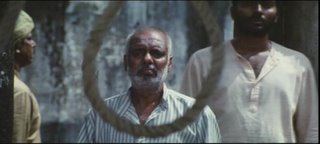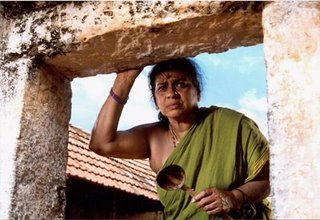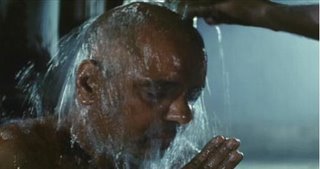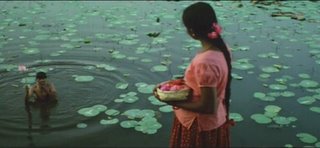Tuesday, September 26, 2006
Nizhalkuthu(shadow Kill) - Malayalam -2002

For all those who have been waiting to see a Adoor movie.Here atlast one of his movie is out on DVD.First run features in alliance with The Global Film Initiative a nonprofit foundation has come out with the Global film initiative. The Initiative is to promote cross-cultural understanding through the medium of cinema. And adoor's last movie Nizhalkuthu has found a place in their collection.
Nizhalkuthu is another good movie from one of india's finest directors, Adoor Gopalakrishnan.This time he tells the story of a poor old hangman called Kaliappan.Through Kaliappan's story, adoor throws at us various questions regarding, justice and responsibilities. Well, more than the story and the moral question's it is the way that the story is narrated that makes you feel that you have watched a work from a master director.
The story is set in the pre independence time period, in the early 1940's.A time period when india still had is past as kings and queens, present as british and future as freedom fighters. Kaliappan is a hangman for the state of travancore. He lives with his wife, son and daughter .His son is a freedom fighter, who has taken to gandhian ways.The story slowly builds up to a hanging that is about to take place.The night before the hanging, Kaliappan comes to know that, the person that he is going to hang is innocent. what happens to that execution is the story. Well that is the shortest summary of the story.

A typical movie executioner is a bulky evil looking person, who comes as a guy who is insensitive towards the accused. But in this movie,adoor shows a different type of an executioner.A meek and guilt driven guy, who is like any of us. He is a god fearing family man, with all the problems that a man of his age faces.And oduvil unnikrishnan has brought that executioner to life with a very good performance.
The story is nothing without the narration style.Adoor proves why he is a master director with his narration style. For a layman it is a simple straight forward narration, you can hardly find anything complex. But this is a complex narration. Details on the Analysis section.
The movie is multi layered and filled with so many interesting scenes. Repeated watching makes the movie more enjoyable and keeps revealing more things than what you saw the first time. There isn't a single scene wasted in the movie. Every scene is important. Especially what the two villagers talk. The villagers are personification of the public. So watch carefully.
 Reeja
ReejaCast and Cedits:
Oduvil Unnikrishnan .... Kaliyappan the executioner
Sukumari .... Marakatam, his wife
Reeja .... Mallika, the younger daughter
Thara Kalyan .... Madhavy, the older daughter
Murali .... Vasu, Madhavy's Husband
Sivakumar .... Mallika's Lover
Sunil .... Muthu, Kaliyappan's son
Nedumudi Venu .... Jailer
Vijayaraghavan .... Jailer
Jagathi Sreekumar .... Maharajah's Officer
Indrans .... Barber
Cinematography by
Sunny Josef
Ravi Varma
Film Editing by
Ajith
 Murali
MuraliGood acting by everyone. Oduvil Unnikrishnan as kaliappan has given credibility to the character.He was great, as an alcoholic or a guy bearing the guilt of killing innocent men. The 2001 best actor national ward winner murali, comes for a few scene and with other like sukumari,vijaya raghavan and nedumudi venu , plays his part to perfection.Reeja and sunil the new faces are also good.
 Sukumari
SukumariMusic:
Music is by Maestro illayaraja.I generally like his background scores. But not in this one.He comes up with his usual stand out background scores, which some times makes us feel that it is too much for a slow moving, minimalistic movie like this.
Awards and recognitions:
2002 kerala state awards
Best Actor :Oduvil Unnikrishnan(Nizhalkuthu)
Second Best
Actor :Jagathy Sreekumar(Nizhalkuthu, Meeshamadhavan)
Best Photographer :Mankada Ravivarma, Sunny Joseph (Nizhalkuthu)
Best Editor :B. Ajithkumar (Bhavam, Nizhalkuthu)
Best Art Director :Suresh Kollam (Nammal)
Best Sound Recordist : N. Harikumar (Nizhalkuthu)
Best Costume Designer : S.B.Sathish (Nizhalkuthu)
Links:
Nizhalkkuthu Dvd
Nizhalkuthu reception
Trivia:
* Sunil was actually rajeev menon's assistant. Adoor who came to rajeev menon for some help with selecting camera, came across sunil and he became an actor. He has acted in few films in malayalam.He also did a hero role in tamil movie called Chithiram Pesuthadi under a different name, Narain.
* Oduvil passed away on 27 May 2006.
Title:
If you are still wondering what the title means?. Shadow kill means killing indirectly.It comes from the practice of killing a person by killing a doll or some other objects.This practice is mentioned in mahbharatha. Here is an interesting story from the mahabharatha episode.You can relate the malayan character with that of kaliappan character in the movie, reluctant to do the shadow kill and feeling guilty about it.
Abhicara - Black Magic.
Duryodhana orders Malayan to kill Pandavas by piercing the shadow. Malayan refuses saying that both Pandavas and Kauravas are kings to him. Also Krishna is with the Pandavas,hence he will not be able to do so. Duryodhana threatens to kill him. To avoid the work, Malayan demands things such as lamp of sun, plate of moon, measure of darkness,eggs of elephant, arrows of Rama, twenty one leaves of water etc., which are impossible to get.He also demands that Dussala (Duryodhana's sister) should be sacrificed in the abhicara.
This enrages Duryodhana. He suspects that Malayan is trying to avoid the work by giving excuses. He repeats the threat to kill him if Malayan does not perform the task. Malayan promises to perform the abhicara using available things.While performing the abhicara of shadow piercing, the Malayan looks at the black (Anjanam) stone. He is surprised that the shadows are not visible on the black stone. Realising that if this abhicara is not successful, the king will kill him, he prays to the gods to help him.Then he sees the shadows along with Krishna. He is deeply worried and prays to have mercy on him. Then Krishna's shadow disappears. Malayan realizes that his aim is accomplished. He prays for pardon saying that he was forced to do the task.
After killing the Pandavas by shadow piercing, Malayan is praised by Duryodhana who gives him many gifts. On the way back, Malayan thinks that he has committed a sin and how he can face his wife.Seeing him unhappy, his wife asks the reason.Malayan tells her that on the way he saw a deer with five does and he killed the does by abhicara. The worried wife further questions him. Malayan admits that he was forced by Duryodhana to kill the Pandavas by nizhalkkuttu (piercing the shadow).Hearing this, the wife is devastated and enraged. She tells Malayan that he will also experience Kunti's grief now. She kills her own son and rushes to see Pandavas. Seeing this Malayan falls unconscious.
Kunti finds her sons dead, suddenly. She cries out and prays to Krishna to help her. Krishna appears. Kunti is relieved to see Krishna. Krishna touches the Pandavas and revives them.Then Malayan's wife arrives. Krishna asks her why she has come. She tells Krishna that Malayan was threatened and forced by Duryodhana to kill the Pandavas by nizhalkkuttu (shadow piercing).
Krishna tells her that he knows everything. Killing her own son was an extreme step.Her son will live again. There will not be any hatred towards Malayan.All these were caused by Duryodhana . Yudhishthira and Kunti praise Krishna.Krishna assures Kunti that he will always protect Pandavas.
from
http://www.geocities.com/harindranath_a/maha/variation/nizhal.pdf

Analysis:
**** spoilers a head. I recommend reading this section after watching the movie.****************
The movie is filled with ironies, counterpoints and the cyclic nature of things. For example the Cylclic nature of life and death is shown in the way the rope that is used to hang the prisoner is burt and the ashes are again used to heal sick peoples. And when one rope ends another one becomes available.
Comming back to the narration, Kaliappan at the start, drinks at the arrack shop and says that he hanged an innocent man. Actually that scene is not the start. That is actually the end of the movie.He was actually talking about the guy who he(rather his son) executes later in the movie .The whole story is actually a flash back. But you don’t know when the flash back begins.
 Nedumudi venu & Vijaya Raghavan
Nedumudi venu & Vijaya RaghavanBefore the execution night kaliappan sits with the jailers are drinks. The jailer starts telling a story. Adoor uses an awesome technique here, he makes kaliappan visualize the whole story in terms of his family members. This way he personalizes the story to make the listener feel the pain.
A hangman,or for that matter anyone, won't feel the pain or helplessness of an innocent guy, who is going to be hanged. For them he is a distant person who they don't know, who they cannot sympathize. So when they read a news article or hear a news about an innocent man hanged.They don't feel anything for the denied justice.They dont care whether it is a real kill or a shadow kill.An example is the two villagers at the start of the movie.Talking about the sensational case where the influential real culprit got away from punishment and how a stupid boy got the death sentence. How can you make these people feel for the injustice that has happened?. You can do that only when you make the pain & injustice personal. In order to make the hangman sympathize, Adoor makes him visualize the story of a third person in terms of the characters that he already knows. With those characters everything falls into perspective and he can sympathies for the man to be hanged, Feel the pain of injustice and get angry over the real culprit, not being punished.

Another example of the cyclic nature of the movie is who has to bear the sin. The two villagers who basically represent the public come in 2 scenes and contribute a lot to the movie. In the second scene they talk about who bears the sin of killing an innocent man?. who is accountable to god?. One villager says that it is the king as he is the one who orders the hanging, for that the other says the king escapes that by a practice he follows. The king actually sends a letter to the person to be hanged, revoking the hanging sentence and pardoning him just before the execution. But the message is deliberately made to arrive a few minutes after the hanging. So by sending the pardon letter, the king washes off his sins, he says.
That throws the question, who actually bears the sin?.If the king is gone then it must be the hangman. But Again coming back to the cyclic nature of things in the movie.Kalippan every time prays to goddess kali, especially before execution about how he is just an instrument in the goddess's hands and how everything that he does is her own actions.He uses words like "You are the sin and the sinner". By these prayers kaliappan squarely puts the blame on the goddess herself.
As i said before, the movie is filled with ironies and counterpoints.Here are a few scenes that come to my mind.
**As the day of execution nears, the public starts thinking that the power of kaliappan has increased. The women who bathe at the tank, go to the level of telling that there is a halo around his head. But in reality, Kaliappan becomes more disturbed, more alcoholic, more afraid and weak.
**There is a scene in which the school teacher teaches a poem about the certainity of death in the class, and kaliappan's daughter bleeds and attain's puberty, a sign of birth.
**Adoor cuts the scene of muthu, Kaliappan's gandhian son spining the cotton with that of the prisoners spinning the threads to make the hanging rope.
**Adoor puts muthu as a counterpoint to kaliappan character. Muthu is gandhian who is against drinking, Kaliappan is an alcoholic.Muthu is a vegetarian, he is against killing animals.Kaliappan executes peoples even after knowing that they are innocent.
**Lot of people complained about how the puberty function of mallika is shown for a long time and it is there just to appease the foreign audience. But i think it was shown more to keep in sync with the various other death scenes that are shown in the movie. In the later part of the movie there are long scene of preparation for the hanging, if you consider the puberty function as a counter point to those death scenes in the movie. Then you can understand why that scene was there and why that long.


**At the start of the movie the rich guy asks sunil about his father and laughs at him for being a gandhian and asks him."Do you think you and gandhi can bring freedom to us?". You can take this statement in two ways, one even though sunil is a gandhian he is not steadfast on his principles. He compromises for his family. When his mother asks him not to go to the club to give the handspun threads and take care of the household work. He obliges and later in the movie he again compromises for his father.So the unsteadfast sunil is not going to bring freedom for the villagers.
If you take the same dialogue with gandhi bringing freedom to us. It could be a suggestion that he still hasn't got us the real FREEDOM.
Also Adoor hits at few things in the movie.

##The rich villager after talking to sunil, looks at the women who passes by and asks the other guy, who she is. Later they both talk about her and the talks convey that the rich guy might go after her. Is that an indication of some crime to happen later??. Will another woman be violated. Will another rich man escape the law?. will another innocent/poor guy be punished wrongly?.
##At the end of the movie the gandhian son who wears the white cap and kurtha is shown in black dress and black cap.A sign of a dark future for him??. He seemed more caring and fragile person. Will he also be suffering like his dad?.

The jailer when narrating the story to kaliappan starts with describing the beauty of the village and the innocent love story of the village girl.Everything seems to be perfect.Till the evil thoughts of one man comes out.All the peace and beauty in the world or only destroyed by the evil thoughts of human beings.


If you notice there are lots of shots of natural scenery and scenes involving the five elements.Adoor with these scenes and the many counterpoints, cyclic things in the movie, tries to bring a cosmic balance to the story.
******************************
Comments:
<< Home
nameste
loved your reviews,good post.
will keep dropping,looking forward to more reviews...
cheers,
i am including your blog to my collections of film blogs ''jhaji's BLOGYWOOD''
will be happy if you link my blogs too.
happy blogging.
jhaji.
http://jhaji-jhaji.blogspot.com/
http://directorji.blogspot.com/
loved your reviews,good post.
will keep dropping,looking forward to more reviews...
cheers,
i am including your blog to my collections of film blogs ''jhaji's BLOGYWOOD''
will be happy if you link my blogs too.
happy blogging.
jhaji.
http://jhaji-jhaji.blogspot.com/
http://directorji.blogspot.com/
i remember watching this movie a couple of years ago. Nizhalkuthu (like his other mvoies) has excellent camera work. Most of the shots are closeups. He deftly uses the facial expressions of the actors. He is one of the few indian directors who follows the neo-realistic way of movie making.
Try to lay hands on some of his documentary work (there is one on Kathakali that is an absolute must).
His other movies include
Swayamvaram
Kodiyettam
Elippathayam
Mukhamukham
Anantharam
Mathilukal
Vidheyan
Kathapurushan
Try to lay hands on some of his documentary work (there is one on Kathakali that is an absolute must).
His other movies include
Swayamvaram
Kodiyettam
Elippathayam
Mukhamukham
Anantharam
Mathilukal
Vidheyan
Kathapurushan
sakshi,
I would love to see those movie.But the bane of malayalam movies, theunavailabilty of good movies like these on videos and DVD's is the problem.
I would love to see those movie.But the bane of malayalam movies, theunavailabilty of good movies like these on videos and DVD's is the problem.
Thank you for this careful detailing~ the point about the first scene being the flashback was truly illuminating,I hadn't figured that out, the points about life and death (in a continuum) are evident, though you have done well to enlist them.
There is another point that I was thinking about as I was watching the film, coz I knew that the son inherits the father's profession, and looking at the Gandhian boy I was wondering how he'd step into his father's shoes. I was hoping at some confrontation/ at least a dialogue between son and father. That never happens, even in the end.
As a final point, I was wondering, if the remorse filled Kaliappan was so weighed down by age as happens with all of us, thinking about all that he has gone through in life, and asking for deliverance(?) And hoping that someone succeeds him, in fact he does ask once isn't there anybody else who'd so this? We do not know if he actually wanted his son to succeed him, still thinking!
Post a Comment
There is another point that I was thinking about as I was watching the film, coz I knew that the son inherits the father's profession, and looking at the Gandhian boy I was wondering how he'd step into his father's shoes. I was hoping at some confrontation/ at least a dialogue between son and father. That never happens, even in the end.
As a final point, I was wondering, if the remorse filled Kaliappan was so weighed down by age as happens with all of us, thinking about all that he has gone through in life, and asking for deliverance(?) And hoping that someone succeeds him, in fact he does ask once isn't there anybody else who'd so this? We do not know if he actually wanted his son to succeed him, still thinking!
<< Home
